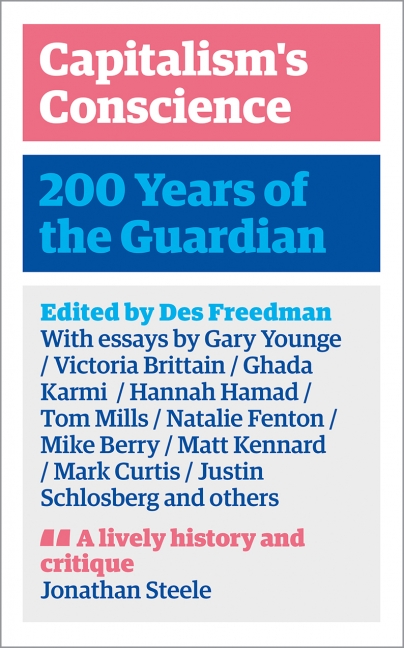Capitalism’s Conscience, 200 Years of the Guardian edited by Des Freedman published by Pluto Press

Developing an understanding of how to overthrow capitalism, end the climate and species crisis, will not only come from lectures, and classes, it needs people’s experiences, and thirst for knowledge. The ownership and control of the media has always been a problem, but we cannot just go around it just by going to particular websites or blogs. I would argue people still need to read the press, in a critical manner, as we have always had to, and we need to persuade people coming towards us to do the same.
I regularly read the Guardian but I know people have stopped reading it apart from occasionally online. Usually they are angry over its attacks on Corbynism and its coverage of the anti-semitism furore. However everyone can gain by reading this book. They could gain some understanding of the makeup of the media.
Some people, particularly, but not only the younger generation, have given up and rely entirely on the internet. For me this is a real problem, because there is just so much out there, including a huge number of opinions claiming to be facts, even claiming to be researched. Alongside this increasing numbers, including younger people, have almost stopped reading books.
This presents a particular problem of understanding and of where we get our information from. How do we assess it, both factually and ideologically. Of course if we are in a political organisation, in this instance Anti-Capitalist Resistance, we learn from our active experience and the whole group of national members and international co-thinkers. We learn from their ideas and the debates we have.
But unfortunately this only includes a small number of people and not enough younger people, whose life experiences are different from ours.
Those of us who were brought up with the Marxist classics had to read books and make assessments of the newspapers, TV and other media. I hope that young people will realise this is necessary to do anyway.
This book, with numerous articles by left-wing people, experts in their spheres, really helps to dissect the Guardian and understand where its positions come from.
The Guardian itself has been featuring its history over the last few weeks, in which it acknowledges its wrong positions on the American Civil War, on women’s rights through to the non-employment of black writers in the 60/70s.
They even say they are not a left paper and these errors are presented as a product of the times.
The Guardian was started by a group of mill owners who drove a more radical Manchester paper out of business. It represented their ‘liberal’ views on the US Civil War, supporting the South, where their cheap cotton came from. It only supported limited voting rights not including women. Later it only accepted suffrage for better off women.
Articles give the ‘whys’ of different positions, there is an article by Victoria Brittain on how the Third World Review section brought almost unknown nationalist leaders to be heard in the UK. This only went on for a limited period, but is an example of how we looked for knowledge in its pages.
Gary Younge as an Editor at Large argues that he was limited in what he could do but that he was able to do more than any other paper would have allowed, so he argues you have to read it, taking into account its own politics.
Ghada Karmi describes its reactionary positions on Palestine, including massive support for the Zionists over Balfour.
The importance of the Women’s Page, is a really interesting article. It became a ‘forum’ for important women’s issues. The article places it before, and then after the development of the ‘modern’ Womens Liberation Movement.
The piece on Latin America was really enlightening for me. Where I might have felt one or other Guardian article was questionable this writer shows its thoroughly reactionary positions, even in the downfall of Lula.
On surveillance, and the Snowdon Documents, many of us couldn’t wait for the next episode. However the article shows how the state worked on the Guardian, started giving it special access, hence the public destruction of the files. Then we had the Julian Assange case and the Guardian was persuaded to change tack.
On phone hacking it was exemplary, in exposing the phone hacking in relation to Milly Dowler and many others. But then they were ostracised, and came back to the mainstream and let the other papers get away with blocking the Leveson report which recommended a new independent watchdog governing press practice.
The chapter on Corbynism and anti-Semitism is worth the purchase price alone, although it has been done better elsewhere, but not specifically in relation to the Guardian. Their support for the right wing in Labour and their real hostility to any radical politics meant that, knowing the majority of their readers at that time were labour voters, they had an impact on the election in 2019. It attempted to demoralise labour activists.
There is an article on the twitter and internet activities of the journalists. Its clear that this is where many get their information. Twenty-six journalists are analysed. It dissects each of their links to each other, right or left and then their relations to MPs and other ‘opinion formers’. No surprise the labour MPs who they mostly follow are right wing or the pro-‘realignment’ groups that left. The exception is John McDonnell, hardly any followed Corbyn.
The other articles are interesting on Brexit, the economy, and how racism is now dealt with.
So a book that is well worth a read. Hopefully it encourages one to read books, and look critically at the newspapers.

